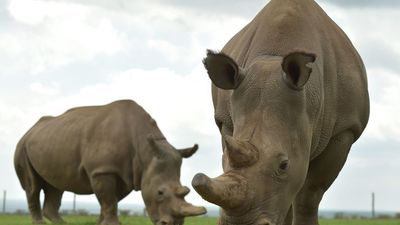How IVF Could Be the Key to Saving a Rhino Species From Extinction
A team of international scientists in Kenya spent the last ten years researching how to save the world’s last two northern white rhinos – the answer might be in vitro fertilization across subspecies.
Scientists have announced that they may have discovered a way to save the Northern white rhino species. The international team from BioRescue made history by successfully transferring a rhino embryo into a surrogate. The surrogate, a southern white rhinoceros named Curra carried the pregnancy for a couple of months until passing from an unrelated bacterial infection, according to Jan Stejskal from BioRescue. Now they plan to try again to save the near-extinct northern white rhinoceros species.
The population of northern white rhinos in Central and East Africa has been on an aggressive decline since the 1960s, due to poaching for rhino horns and human environmental interference. The world’s last two northern white rhinos – Najin and her daughter Fatu – live under 24-hour security in the Ol Pejeta Conservancy in Kenya and are both unable to carry pregnancies. The latest scientific marvel provides a “proof of concept,” according to Stejskal, that this treatment could save the species from extinction. The world’s last male northern white rhino, Sudan, died in 2018.
According to the International Union for Conservation of Nature (IUCN), the northern white rhino and the southern white rhino are classified as subspecies of the white rhino, making it possible for the latter to act as a surrogate. The scientific marvel, announced Wednesday by BioRescue associate and project lead Thomas Hildebrandt, is said to be advantageous for more than just the endangered animal species. “This animal played a crucial role in a complex ecosystem before it got extinct for a while. It lived in the landscape and architecture of central Africa — bringing back the northern white rhino to this ecosystem will help to heal the ecosystem,” he told The Washington Post.
The team has been working on the project in Kenya since 2014, when the eight remaining northern white rhinos kept in captivity did not breed. The team of researchers created the embryos using sperm from two deceased male rhinos, and eggs harvested from Fatu. They are to be carried by southern white rhinos until enough northern white rhinos have been born and reached maturation. The team says that the first northern white rhino could be implanted by May or June this year. If the 16-month pregnancy is successful, this would be the first northern white rhino born since 2000.
